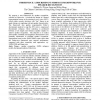120 search results - page 1 / 24 » Discriminant binary data representation for speaker recognit... |
ICASSP
2011
IEEE
12 years 8 months ago
2011
IEEE
In supervector UBM/GMM paradigm, each acoustic file is represented by the mean parameters of a GMM model. This supervector space is used as a data representation space, which has...
ICASSP
2010
IEEE
13 years 4 months ago
2010
IEEE
We propose a new framework for speaker recognition, referred as Fishervoice. It includes the design of a feature representation known as the structured score vector (SSV), which r...
NOLISP
2005
Springer
13 years 9 months ago
2005
Springer
Feature projection by non-linear discriminant analysis (NLDA) can substantially increase classification performance. In automatic speech recognition (ASR) the projection provided b...
MM
2009
ACM
13 years 11 months ago
2009
ACM
Speaker clustering is the task of grouping a set of speech utterances into speaker-specific classes. The basic techniques for solving this task are similar to those used for spea...
ICASSP
2011
IEEE
12 years 8 months ago
2011
IEEE
The recently developed i-vector framework for speaker recognition has set a new performance standard in the research field. An i-vector is a compact representation of a speaker u...

